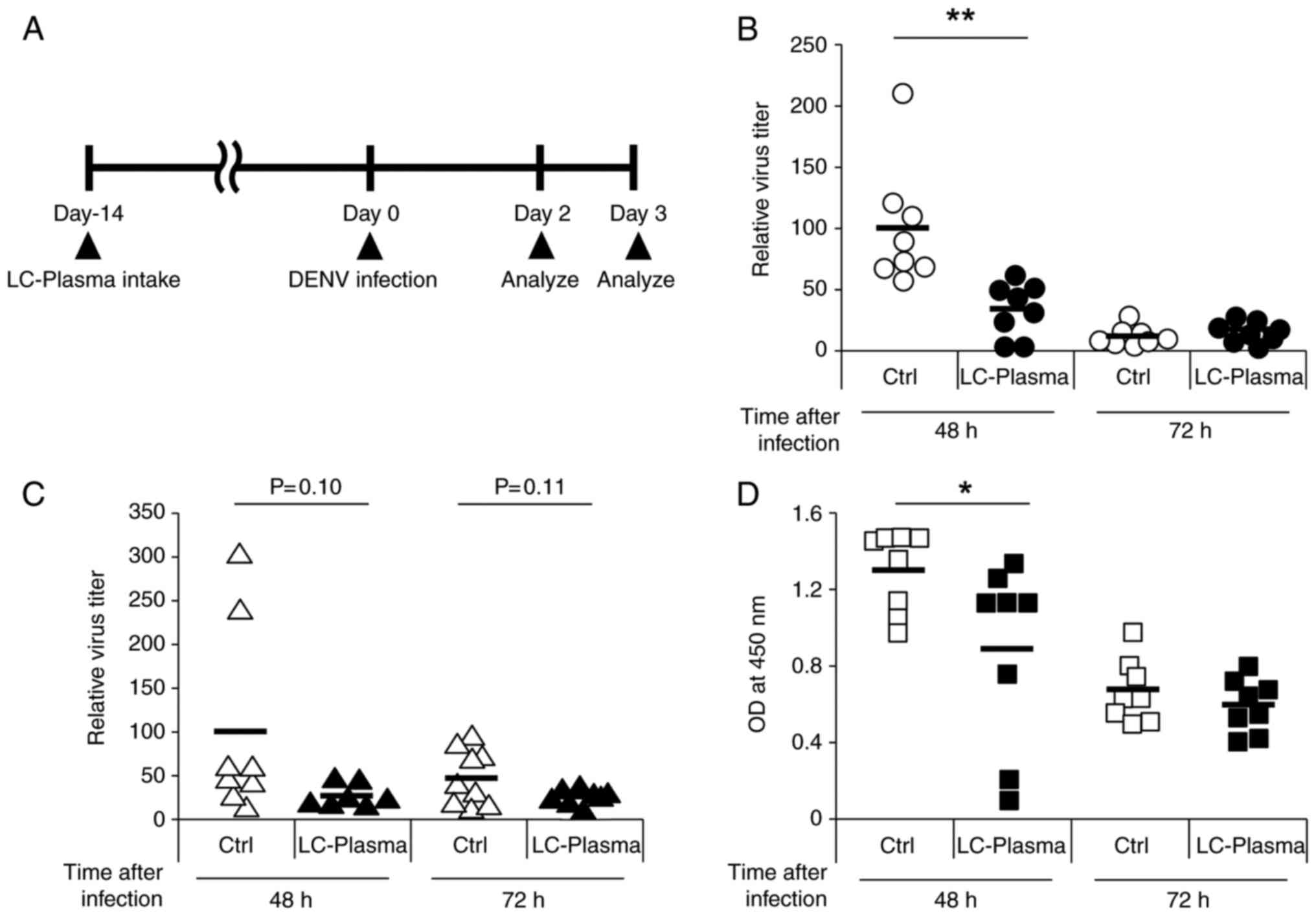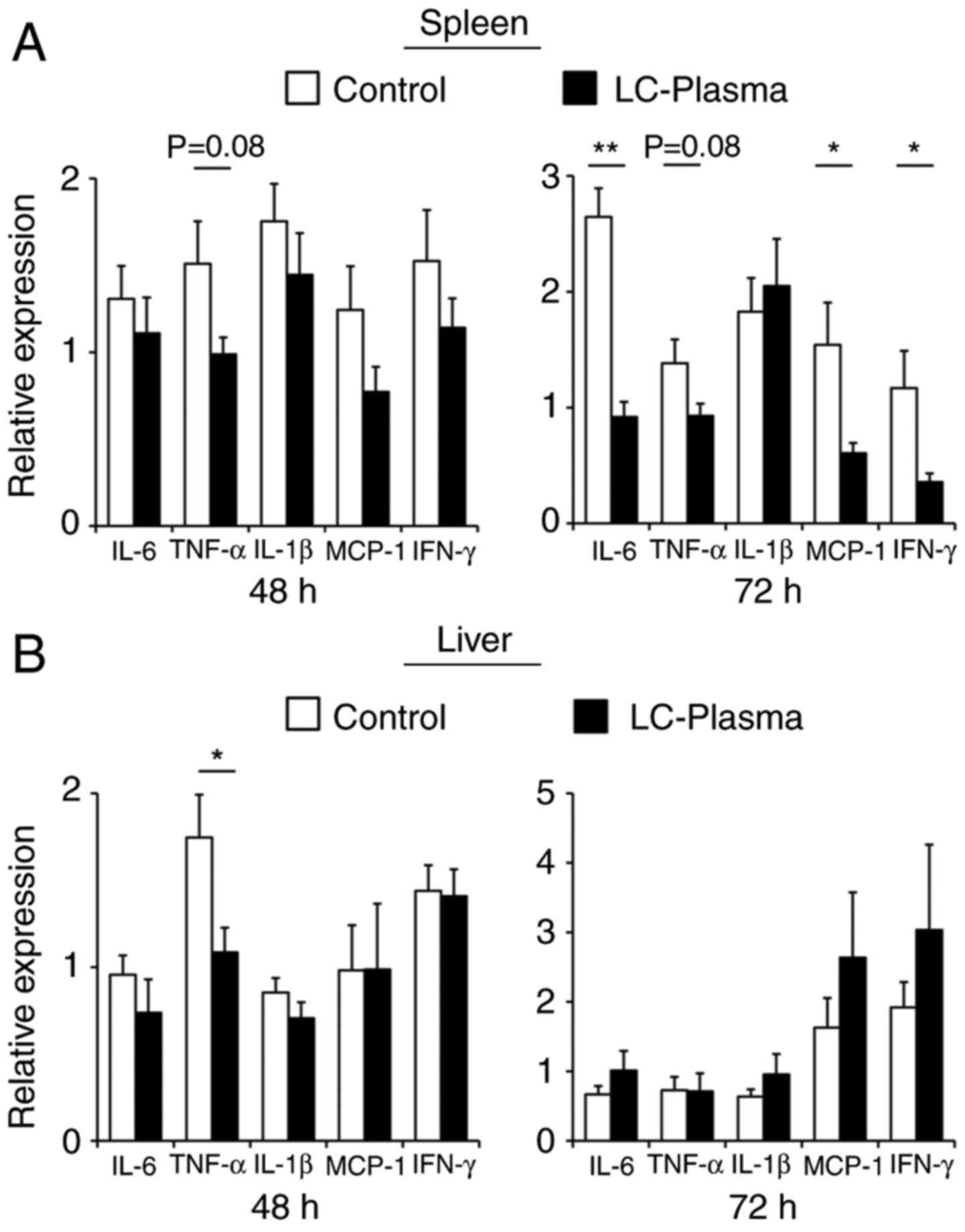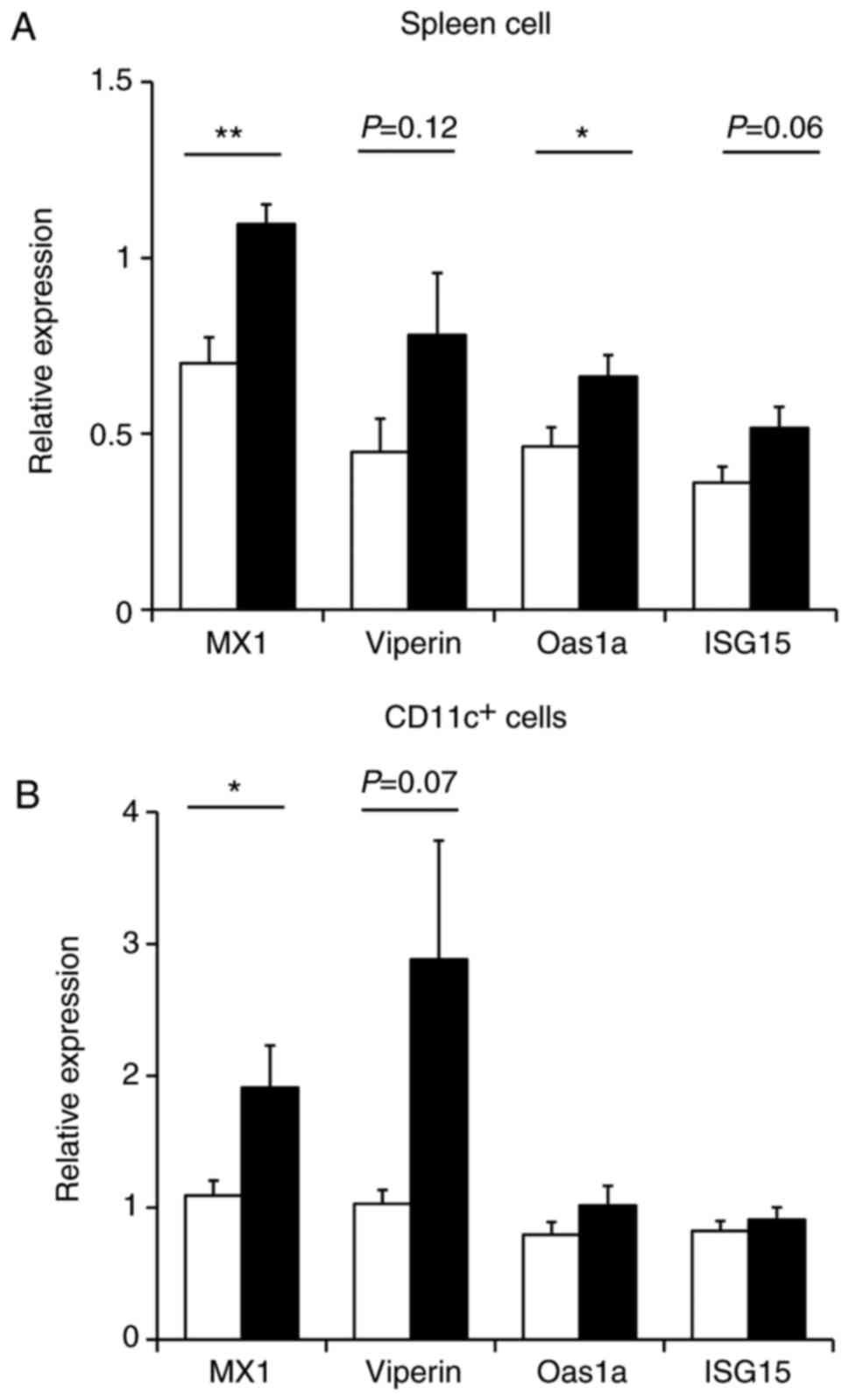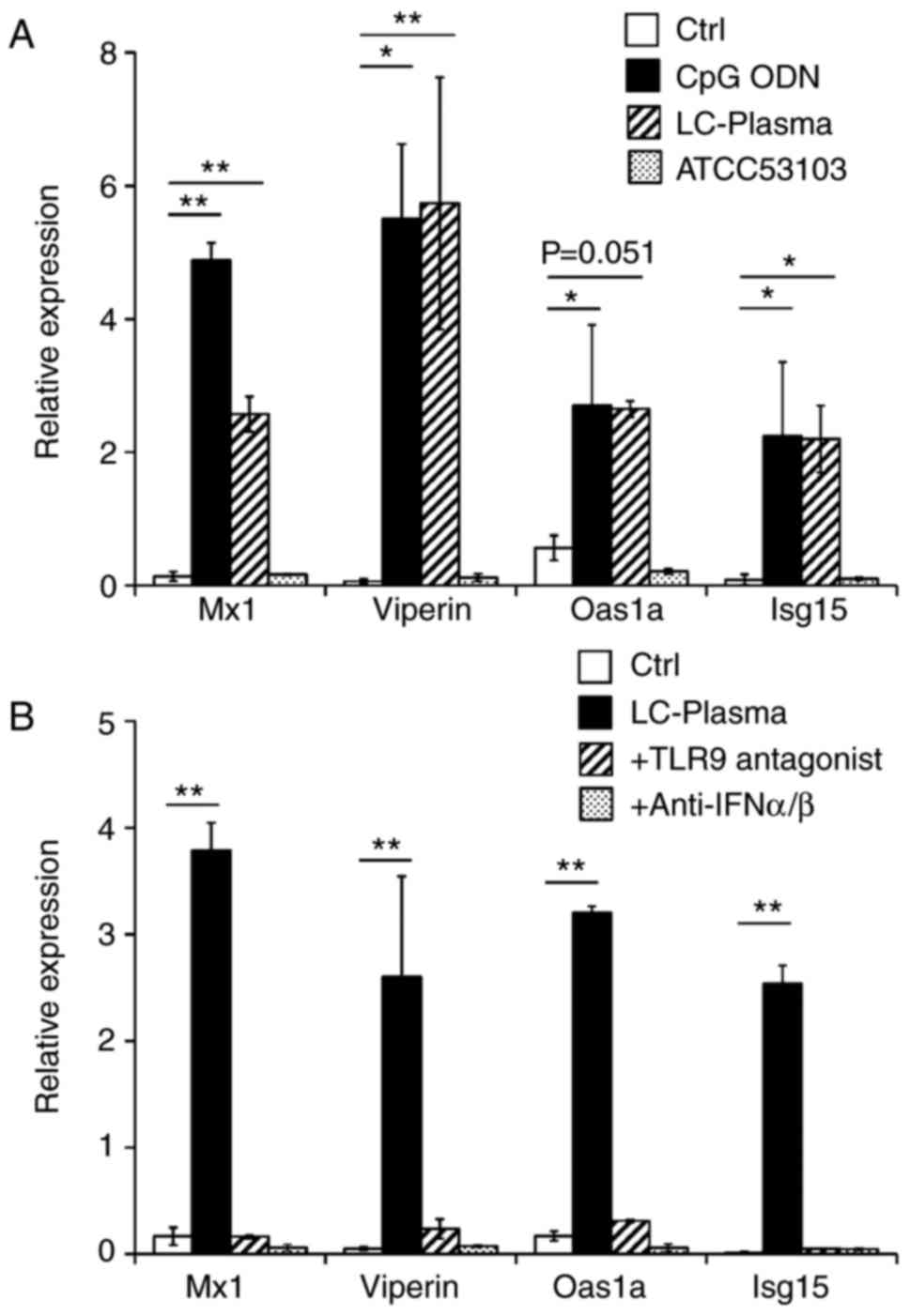|
1
|
Diamond MS and Pierson TC: Molecular
Insight into dengue virus pathogenesis and its implications for
disease control. Cell. 162:488–492. 2015. View Article : Google Scholar : PubMed/NCBI
|
|
2
|
Holmes EC and Burch SS: The causes and
consequences of genetic variation in dengue virus. Trends
Microbiol. 8:74–77. 2000. View Article : Google Scholar : PubMed/NCBI
|
|
3
|
Halstead SB: Dengue. Lancet.
370:1644–1652. 2007. View Article : Google Scholar : PubMed/NCBI
|
|
4
|
Gubler DJ: Dengue/dengue haemorrhagic
fever: History and current status. Novartis Found Symp. 277:3–16.
16–22. 71–73. 251–253. 2006.
|
|
5
|
Srikiatkhachorn A, Mathew A and Rothman
AL: Immune- mediated cytokine storm and its role in severe dengue.
Semin Immunopath. 39:563–574. 2017. View Article : Google Scholar
|
|
6
|
Guzman MG and Kouri G: Dengue: An update.
Lancet Infect Dis. 2:33–42. 2002. View Article : Google Scholar : PubMed/NCBI
|
|
7
|
Kalayanarooj S, Vaughn DW, Nimmannitya S,
Green S, Suntayakorn S, Kunentrasai N, Viramitrachai W,
Ratanachu-eke S, Kiatpolpoj S, Innis BL, et al: Early clinical and
laboratory indicators of acute dengue illness. J Infect Dis.
176:313–321. 1997. View
Article : Google Scholar : PubMed/NCBI
|
|
8
|
Fagundes CT, Costa VV, Cisalpino D, Souza
DG and Teixeira MM: Therapeutic opportunities in dengue infection.
Drug Devel Res. 72:480–500. 2011. View Article : Google Scholar
|
|
9
|
Perry AK, Chen G, Zheng D, Tang H and
Cheng G: The host type I interferon response to viral and bacterial
infections. Cell Res. 15:407–422. 2005. View Article : Google Scholar : PubMed/NCBI
|
|
10
|
Stetson DB and Medzhitov R: Type I
interferons in host defense. Immunity. 25:373–381. 2006. View Article : Google Scholar : PubMed/NCBI
|
|
11
|
Fleming SB: Viral inhibition of the
IFN-induced JAK/STAT signalling pathway: Development of live
attenuated vaccines by mutation of viral-encoded IFN-antagonists.
Vaccines. 4:pii: E232016. View Article : Google Scholar
|
|
12
|
Schoggins JW, Dorner M, Feulner M, Imanaka
N, Murphy MY, Ploss A and Rice CM: Dengue reporter viruses reveal
viral dynamics in interferon receptor-deficient mice and
sensitivity to interferon effectors in vitro. Proc Natl Acad Sci
USA. 109:14610–14615. 2012. View Article : Google Scholar : PubMed/NCBI
|
|
13
|
Zellweger RM, Prestwood TR and Shresta S:
Enhanced infection of liver sinusoidal endothelial cells in a mouse
model of antibody-induced severe dengue disease. Cell Host Microbe.
7:128–139. 2010. View Article : Google Scholar : PubMed/NCBI
|
|
14
|
Zust R, Toh YX, Valdes I, Cerny D,
Heinrich J, Hermida L, Marcos E, Guillén G, Kalinke U, Shi PY, et
al: Type I interferon signals in macrophages and dendritic cells
control dengue virus infection: Implications for a new mouse model
to test dengue vaccines. J Virol. 88:7276–7285. 2014. View Article : Google Scholar : PubMed/NCBI
|
|
15
|
Sarathy VV, White M, Li L, Gorder SR,
Pyles RB, Campbell GA, Milligan GN, Bourne N and Barrett AD: A
lethal murine infection model for dengue virus 3 in AG129 mice
deficient in type I and II interferon receptors leads to systemic
disease. J Virol. 89:1254–1266. 2015. View Article : Google Scholar :
|
|
16
|
Diamond MS and Harris E: Interferon
inhibits dengue virus infection by preventing translation of viral
RNA through a PKR-independent mechanism. Virology. 289:297–311.
2001. View Article : Google Scholar : PubMed/NCBI
|
|
17
|
Helbig KJ, Carr JM, Calvert JK, Wati S,
Clarke JN, Eyre NS, Narayana SK, Fiches GN, McCartney EM and Beard
MR: Viperin is induced following dengue virus type-2 (DENV-2)
infection and has anti-viral actions requiring the C-terminal end
of viperin. PLoS Negl Trop Dis. 7:e21782013. View Article : Google Scholar : PubMed/NCBI
|
|
18
|
Hishiki T, Han Q, Arimoto K, Shimotohno K,
Igarashi T, Vasudevan SG, Suzuki Y and Yamamoto N:
Interferon-mediated ISG15 conjugation restricts dengue virus 2
replication. Biochem Biophys Res Commun. 448:95–100. 2014.
View Article : Google Scholar : PubMed/NCBI
|
|
19
|
Siegal FP, Kadowaki N, Shodell M,
Fitzgerald-Bocarsly PA, Shah K, Ho S, Antonenko S and Liu YJ: The
nature of the principal type 1 interferon-producing cells in human
blood. Science. 284:1835–1837. 1999. View Article : Google Scholar : PubMed/NCBI
|
|
20
|
Cella M, Jarrossay D, Facchetti F,
Alebardi O, Nakajima H, Lanzavecchia A and Colonna M: Plasmacytoid
monocytes migrate to inflamed lymph nodes and produce large amounts
of type I interferon. Nat Med. 5:919–923. 1999. View Article : Google Scholar : PubMed/NCBI
|
|
21
|
Lund JM, Alexopoulou L, Sato A, Karow M,
Adams NC, Gale NW, Iwasaki A and Flavell RA: Recognition of
single-stranded RNA viruses by Toll-like receptor 7. Proc Natl Acad
Sci USA. 101:5598–5603. 2004. View Article : Google Scholar : PubMed/NCBI
|
|
22
|
Hemmi H, Takeuchi O, Kawai T, Kaisho T,
Sato S, Sanjo H, Matsumoto M, Hoshino K, Wagner H, Takeda K, et al:
A Toll-like receptor recognizes bacterial DNA. Nature. 408:740–745.
2000. View Article : Google Scholar : PubMed/NCBI
|
|
23
|
Bauer S, Kirschning CJ, Häcker H, Redecke
V, Hausmann S, Akira S, Wagner H and Lipford GB: Human TLR9 confers
responsiveness to bacterial DNA via species-specific CpG motif
recognition. Proc Natl Acad Sci USA. 98:9237–9242. 2001. View Article : Google Scholar : PubMed/NCBI
|
|
24
|
Gilliet M, Cao W and Liu YJ: Plasmacytoid
dendritic cells: Sensing nucleic acids in viral infection and
autoimmune diseases. Nat Rev Immunol. 8:594–606. 2008. View Article : Google Scholar : PubMed/NCBI
|
|
25
|
Perdigon G, Fuller R and Raya R: Lactic
acid bacteria and their effect on the immune system. Current Issues
Intest Microbiol. 2:27–42. 2001.
|
|
26
|
Parcina M, Wendt C, Goetz F, Zawatzky R,
Zähringer U, Heeg K and Bekeredjian-Ding I: Staphylococcus
aureus-induced plasmacytoid dendritic cell activation is based on
an IgG-mediated memory response. J Immunol. 181:3823–3833. 2008.
View Article : Google Scholar : PubMed/NCBI
|
|
27
|
Piccioli D, Sammicheli C, Tavarini S, Nuti
S, Frigimelica E, Manetti AG, Nuccitelli A, Aprea S, Valentini S,
Borgogni E, et al: Human plasmacytoid dendritic cells are
unresponsive to bacterial stimulation and require a novel type of
cooperation with myeloid dendritic cells for maturation. Blood.
113:4232–4239. 2009. View Article : Google Scholar : PubMed/NCBI
|
|
28
|
Jounai K, Ikado K, Sugimura T, Ano Y,
Braun J and Fujiwara D: Spherical lactic acid bacteria activate
plasmacytoid dendritic cells immunomodulatory function via
TLR9-dependent crosstalk with myeloid dendritic cells. PLoS One.
7:e325882012. View Article : Google Scholar : PubMed/NCBI
|
|
29
|
Jounai K, Sugimura T, Ohshio K and
Fujiwara D: Oral administration of Lactococcus lactis subsp lactis
JCM5805 enhances lung immune response resulting in protection from
murine para-influenza virus infection. PLoS One. 10:e01190552015.
View Article : Google Scholar
|
|
30
|
Jounai K, Sugimura T, Morita Y, Ohshio K
and Fujiwara D: Administration of Lactococcus lactis strain Plasma
induces maturation of plasmacytoid dendritic cells and protection
from rotavirus infection in suckling mice. Int Immunopharmacol.
56:205–211. 2018. View Article : Google Scholar : PubMed/NCBI
|
|
31
|
Castillo Ramirez JA and Urcuqui-Inchima S:
Dengue virus control of type I IFN responses: A history of
manipulation and control. J Interferon Cytokine Res. 35:421–430.
2015. View Article : Google Scholar : PubMed/NCBI
|
|
32
|
Livak KJ and Schmittgen TD: Analysis of
relative gene expression data using real-time quantitative PCR and
the 2−ΔΔCT method. Methods.
25:402–408. 2001. View Article : Google Scholar
|
|
33
|
St John AL, Rathore AP, Raghavan B, Ng ML
and Abraham SN: Contributions of mast cells and vasoactive
products, leukotrienes and chymase, to dengue virus-induced
vascular leakage. Elife. 2:e004812013. View Article : Google Scholar : PubMed/NCBI
|
|
34
|
da Costa VG, Marques-Silva AC and Moreli
ML: A meta-analysis of the diagnostic accuracy of two commercial
NS1 antigen ELISA tests for early dengue virus detection. PLoS One.
9:e946552014. View Article : Google Scholar : PubMed/NCBI
|
|
35
|
Brawand P, Fitzpatrick DR, Greenfield BW,
Brasel K, Maliszewski CR and De Smedt T: Murine plasmacytoid
pre-dendritic cells generated from Flt3 ligand-supplemented bone
marrow cultures are immature APCs. J Immunol. 169:6711–6719. 2002.
View Article : Google Scholar : PubMed/NCBI
|
|
36
|
Raut CG, Deolankar RP, Kolhapure RM and
Goverdhan MK: Susceptibility of laboratory-bred rodents to the
experimental infection with dengue virus type 2. Acta Virol.
40:143–146. 1996.PubMed/NCBI
|
|
37
|
Johnson AJ and Roehrig JT: New mouse model
for dengue virus vaccine testing. J Virol. 73:783–786. 1999.
|
|
38
|
Orozco S, Schmid MA, Parameswaran P,
Lachica R, Henn MR, Beatty R and Harris E: Characterization of a
model of lethal dengue virus 2 infection in C57BL/6 mice deficient
in the alpha/beta interferon receptor. J Gen Virol. 93:2152–2157.
2012. View Article : Google Scholar : PubMed/NCBI
|
|
39
|
Zellweger RM and Shresta S: Mouse models
to study dengue virus immunology and pathogenesis. Front Immunol.
5:1512014. View Article : Google Scholar : PubMed/NCBI
|
|
40
|
Syenina A, Jagaraj CJ, Aman SA, Sridharan
A and St John AL: Dengue vascular leakage is augmented by mast cell
degranulation mediated by immunoglobulin Fcγ receptors. Elife. 4:
View Article : Google Scholar : 2015.
|
|
41
|
Gubler DJ: Dengue and dengue hemorrhagic
fever. Clin Microbiol Rev. 11:480–496. 1998. View Article : Google Scholar : PubMed/NCBI
|
|
42
|
Green S and Rothman A: Immunopathological
mechanisms in dengue and dengue hemorrhagic fever. Curr Opin Infect
Dis. 19:429–436. 2006. View Article : Google Scholar : PubMed/NCBI
|
|
43
|
Srikiatkhachorn A: Plasma leakage in
dengue haemorrhagic fever. Thromb Haemost. 102:1042–1049. 2009.
View Article : Google Scholar : PubMed/NCBI
|
|
44
|
Chaturvedi UC, Agarwal R, Elbishbishi EA
and Mustafa AS: Cytokine cascade in dengue hemorrhagic fever:
Implications for pathogenesis. FEMS Immunol Med Microbiol.
28:183–188. 2000. View Article : Google Scholar : PubMed/NCBI
|
|
45
|
Verhelst J, Hulpiau P and Saelens X: Mx
proteins: Antiviral gatekeepers that restrain the uninvited.
Microbiol Mol Biol Rev. 77:551–566. 2013. View Article : Google Scholar : PubMed/NCBI
|
|
46
|
Fitzgerald KA: The interferon inducible
gene: Viperin. J Interferon Cytokine Res. 31:131–135. 2011.
View Article : Google Scholar :
|
|
47
|
Zhao C, Collins MN, Hsiang TY and Krug RM:
Interferon- induced ISG15 pathway: An ongoing virus-host battle.
Trends Microbiol. 21:181–186. 2013. View Article : Google Scholar : PubMed/NCBI
|
|
48
|
Elkhateeb E, Tag-El-Din-Hassan HT, Sasaki
N, Torigoe D, Morimatsu M and Agui T: The role of mouse
2′,5′-oligoadenylate synthetase 1 paralogs. Infect Genet Evol.
45:393–401. 2016. View Article : Google Scholar : PubMed/NCBI
|
|
49
|
Takeda S, Takeshita M, Kikuchi Y, Dashnyam
B, Kawahara S, Yoshida H, Watanabe W, Muguruma M and Kurokawa M:
Efficacy of oral administration of heat-killed probiotics from
Mongolian dairy products against influenza infection in mice:
Alleviation of influenza infection by its immunomodulatory activity
through intestinal immunity. Int Immunopharmacol. 11:1976–1983.
2011. View Article : Google Scholar : PubMed/NCBI
|
|
50
|
Fujiwara D, Inoue S, Wakabayashi H and
Fujii T: The anti-allergic effects of lactic acid bacteria are
strain dependent and mediated by effects on both Th1/Th2 cytokine
expression and balance. Int Arch Allergy Immunol. 135:205–215.
2004. View Article : Google Scholar : PubMed/NCBI
|
|
51
|
Wakabayashi H, Nariai C, Takemura F, Nakao
W and Fujiwara D: Dietary supplementation with lactic acid bacteria
attenuates the development of atopic-dermatitis-like skin lesions
in NC/Nga mice in a strain-dependent manner. Int Arch Allergy
Immunol. 145:141–151. 2008. View Article : Google Scholar
|


















